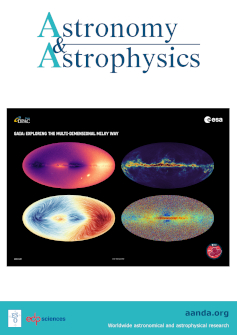常-ES
IF 5.4
2区 物理与天体物理
Q1 ASTRONOMY & ASTROPHYSICS
引用次数: 0
摘要
背景宇宙射线可能是驱动大尺度星系风的非常重要的动力。边缘星系可以让我们以局外人的视角观察射电光环,以及它们的平面外宇宙射线电子和磁场。我们对附近的边缘星系 NGC 4217 进行了一次新的射电连续波成像研究。我们研究了平面外宇宙射线和磁场的分布。我们利用S波段(2-4千兆赫)的扬斯基超大阵列(JVLA)和144兆赫的LOFAR(LOw Frequency ARray)对其进行了观测。我们测量了垂直强度剖面和指数尺度高度。我们以匹配的角分辨率对 JVLA 和 LOFAR 数据进行了重新成像,以测量 144 MHz 和 3 GHz 之间的射电光谱指数。在成像之前,我们减去了容易混淆的点状源。然后,我们利用宇宙射线电子平流模型对强度剖面进行拟合,使用的是由热气体压力和宇宙射线共同驱动的等温风模型。我们在星系盘西北侧发现了一个大尺度射电晕。其形态让人联想到一个从圆盘延伸到 20 kpc 的气泡。我们在气泡中发现了光谱老化现象,这使我们能够测量宇宙射线电子的平流速度,其加速度为 300 至 600 千米/秒。假设宇宙射线和磁场之间能量均等,我们估计气泡可能是在其 35 Myr 的动力学时间尺度内,由超新星注入的动能的 10% 膨胀而成的。虽然没有探测到活动星系核(AGN),但不能排除近期内有此类活动的可能。大小为数十千帕斯卡的非热气泡可能是恒星形成星系的一个普遍特征,如果是这样的话,这将证明反馈的影响。要确定AGN反馈可能造成的影响,还需要更深入的观测。本文章由计算机程序翻译,如有差异,请以英文原文为准。
CHANG-ES
Context. Cosmic rays may be dynamically very important in driving large-scale galactic winds. Edge-on galaxies give us an outsider’s view of radio haloes, and of their extra-planar cosmic-ray electrons and magnetic fields.Aims. We present a new radio continuum imaging study of the nearby edge-on galaxy NGC 4217. We examine the distribution of extra-planar cosmic rays and magnetic fields. We observed it with both the Jansky Very Large Array (JVLA) in the S band (2–4 GHz) and the LOw Frequency ARray (LOFAR) at 144 MHz.Methods. We measured vertical intensity profiles and exponential scale heights. We re-imaged both the JVLA and LOFAR data at matched angular resolution in order to measure radio spectral indices between 144 MHz and 3 GHz. Confusing point-like sources were subtracted prior to imaging. We then fitted intensity profiles with cosmic-ray electron advection models, using an isothermal wind model that is driven by a combination of pressure from the hot gas and cosmic rays.Results. We discover a large-scale radio halo on the north-western side of the galactic disc. The morphology is reminiscent of a bubble extending up to 20 kpc from the disc. We find spectral ageing in the bubble, which allowed us to measure the advection speeds of the cosmic-ray electrons, which accelerate from 300 to 600 km s−1. Assuming energy equipartition between the cosmic rays and the magnetic field, we estimate the bubble may have been inflated by a modest 10% of the kinetic energy injected by supernovae over its dynamical timescale of 35 Myr. While no active galactic nucleus (AGN) has been detected, such activity in the recent past cannot be ruled out.Conclusions. Non-thermal bubbles with sizes of tens of kiloparsecs may be a ubiquitous feature of star-forming galaxies, and if so this would demonstrate the influence of feedback. Determining possible contributions by AGN feedback will require deeper observations.
求助全文
通过发布文献求助,成功后即可免费获取论文全文。
去求助
来源期刊

Astronomy & Astrophysics
地学天文-天文与天体物理
CiteScore
10.20
自引率
27.70%
发文量
2105
审稿时长
1-2 weeks
期刊介绍:
Astronomy & Astrophysics is an international Journal that publishes papers on all aspects of astronomy and astrophysics (theoretical, observational, and instrumental) independently of the techniques used to obtain the results.
 求助内容:
求助内容: 应助结果提醒方式:
应助结果提醒方式:


